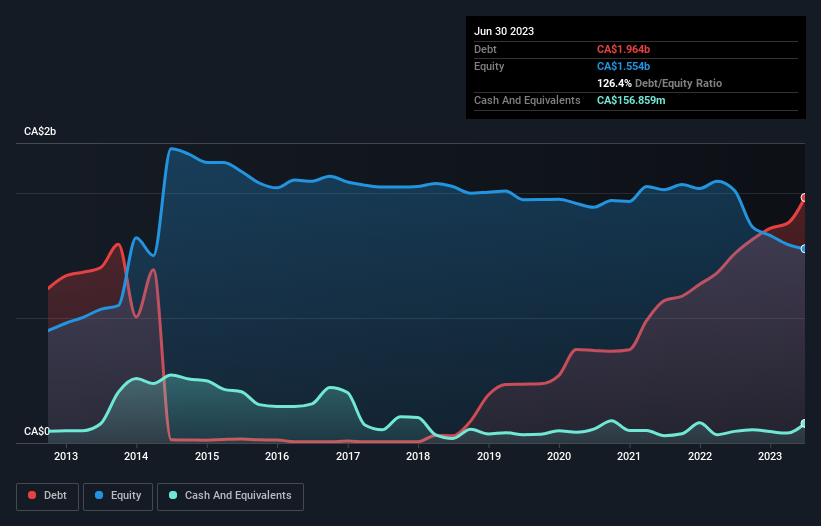Some say volatility, rather than debt, is the best way to think about risk as an investor, but Warren Buffett famously said that 'Volatility is far from synonymous with risk.' So it seems the smart money knows that debt - which is usually involved in bankruptcies - is a very important factor, when you assess how risky a company is. Importantly, Maple Leaf Foods Inc. (TSE:MFI) does carry debt. But should shareholders be worried about its use of debt?
What Risk Does Debt Bring?
Generally speaking, debt only becomes a real problem when a company can't easily pay it off, either by raising capital or with its own cash flow. Part and parcel of capitalism is the process of 'creative destruction' where failed businesses are mercilessly liquidated by their bankers. While that is not too common, we often do see indebted companies permanently diluting shareholders because lenders force them to raise capital at a distressed price. Of course, debt can be an important tool in businesses, particularly capital heavy businesses. The first thing to do when considering how much debt a business uses is to look at its cash and debt together.
View our latest analysis for Maple Leaf Foods
What Is Maple Leaf Foods's Net Debt?
You can click the graphic below for the historical numbers, but it shows that as of June 2023 Maple Leaf Foods had CA$1.96b of debt, an increase on CA$1.51b, over one year. However, it does have CA$156.9m in cash offsetting this, leading to net debt of about CA$1.81b.

How Strong Is Maple Leaf Foods' Balance Sheet?
We can see from the most recent balance sheet that Maple Leaf Foods had liabilities of CA$1.01b falling due within a year, and liabilities of CA$1.99b due beyond that. Offsetting these obligations, it had cash of CA$156.9m as well as receivables valued at CA$323.6m due within 12 months. So it has liabilities totalling CA$2.52b more than its cash and near-term receivables, combined.
This is a mountain of leverage relative to its market capitalization of CA$3.55b. This suggests shareholders would be heavily diluted if the company needed to shore up its balance sheet in a hurry. The balance sheet is clearly the area to focus on when you are analysing debt. But ultimately the future profitability of the business will decide if Maple Leaf Foods can strengthen its balance sheet over time. So if you're focused on the future you can check out this free report showing analyst profit forecasts.
In the last year Maple Leaf Foods wasn't profitable at an EBIT level, but managed to grow its revenue by 5.0%, to CA$4.9b. We usually like to see faster growth from unprofitable companies, but each to their own.
Caveat Emptor
Importantly, Maple Leaf Foods had an earnings before interest and tax (EBIT) loss over the last year. Indeed, it lost CA$71m at the EBIT level. When we look at that and recall the liabilities on its balance sheet, relative to cash, it seems unwise to us for the company to have any debt. So we think its balance sheet is a little strained, though not beyond repair. However, it doesn't help that it burned through CA$199m of cash over the last year. So in short it's a really risky stock. There's no doubt that we learn most about debt from the balance sheet. However, not all investment risk resides within the balance sheet - far from it. We've identified 3 warning signs with Maple Leaf Foods (at least 2 which can't be ignored) , and understanding them should be part of your investment process.
At the end of the day, it's often better to focus on companies that are free from net debt. You can access our special list of such companies (all with a track record of profit growth). It's free.
New: Manage All Your Stock Portfolios in One Place
We've created the ultimate portfolio companion for stock investors, and it's free.
• Connect an unlimited number of Portfolios and see your total in one currency
• Be alerted to new Warning Signs or Risks via email or mobile
• Track the Fair Value of your stocks
Have feedback on this article? Concerned about the content? Get in touch with us directly. Alternatively, email editorial-team (at) simplywallst.com.
This article by Simply Wall St is general in nature. We provide commentary based on historical data and analyst forecasts only using an unbiased methodology and our articles are not intended to be financial advice. It does not constitute a recommendation to buy or sell any stock, and does not take account of your objectives, or your financial situation. We aim to bring you long-term focused analysis driven by fundamental data. Note that our analysis may not factor in the latest price-sensitive company announcements or qualitative material. Simply Wall St has no position in any stocks mentioned.
About TSX:MFI
Maple Leaf Foods
Produces food products in Canada, the United States, Japan, China, and internationally.
Established dividend payer with proven track record.
Similar Companies
Market Insights
Community Narratives



